District of Columbia
LGBTQ voters to choose among friends in D.C. elections
Out gay candidates considered viable in Ward 1, 5 Council races
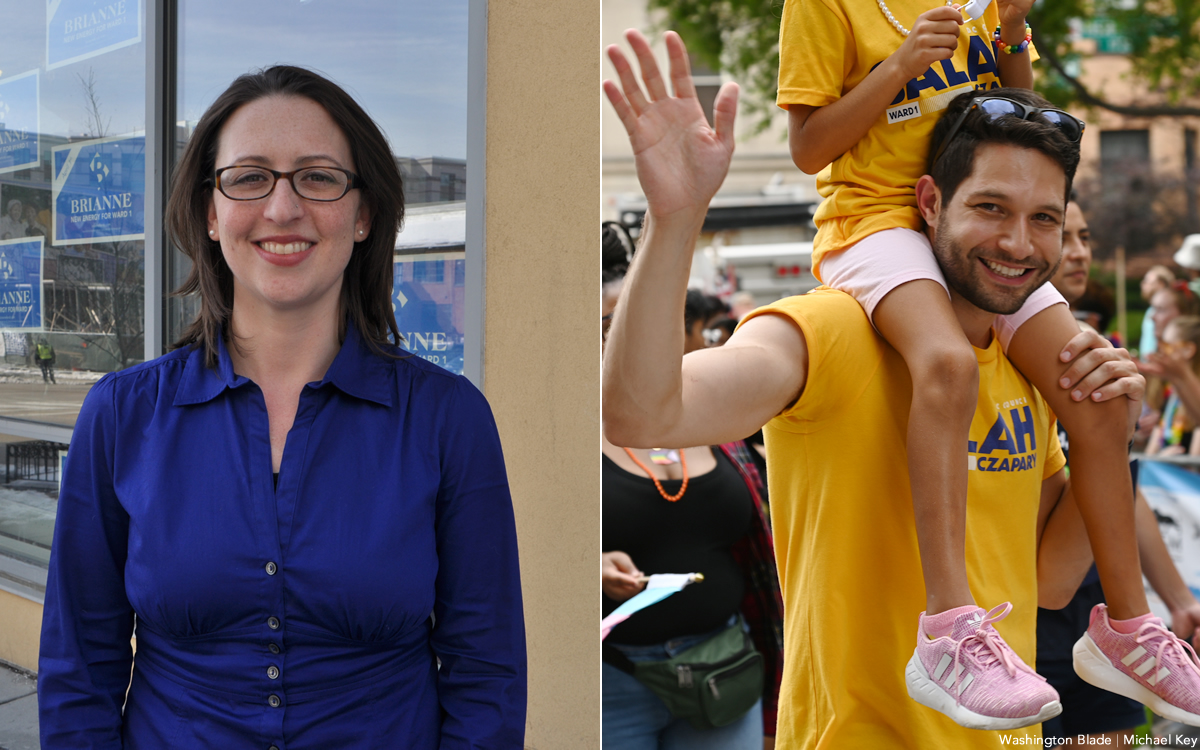
In what LGBTQ activists consider a highly positive development, all serious candidates running for mayor, D.C. Council, Attorney General, and the city’s congressional delegate seat and “shadow” U.S. House seat in the city’s June 21 Democratic primary have either expressed strong support for LGBTQ issues or have long records of support on those issues.
Activists following the election say they expect LGBTQ voters — like all D.C. voters — to decide who to vote for based on a number of other issues, including public safety, affordable housing, and whether the city’s public schools should remain under mayoral control or return to the previous system of an independent school board, among other issues.
“We are fortunate to live in a city where all candidates support the LGBTQ community, so it is other issues our community is focused on,” said gay Democratic activist Peter Rosenstein, who is supporting Mayor Muriel Bowser’s re-election bid for a third term in office.
Other LGBTQ activists, including former Gay and Lesbian Activists Alliance President Rick Rosendall, are backing D.C. Council member Robert White (D-At-Large) for mayor. Like Bowser, Robert White has a long record of support on LGBTQ issues.
Ward 8 Council member Trayon White (D-Ward 8) and community activist and former Advisory Neighborhood Commissioner James Butler are also running for mayor in the Democratic primary. Trayon White has supported LGBTQ issues on the Council and Butler has expressed support for those issues.
The other races on the primary ballot on June 21 include D.C. Council Chair; At-Large D.C. Council member, Council members for Wards 1, 3, 5, and 6; D.C. Attorney General; D.C. Congressional Delegate; and U.S. Representative, also known as the city’s “shadow” House member with no voting powers in Congress.
In an action that surprised some in the LGBTQ community, the Capital Stonewall Democrats, the city’s largest LGBTQ political group, has endorsed Robert White over Bowser in the mayor’s race and Democratic challenger Erin Palmer over incumbent longtime LGBTQ rights supporter Phil Mendelson for the D.C. Council Chair position.
Capital Stonewall Democrats has also endorsed incumbent Ward 1 Council member Brianne Nadeau over her out gay challenger, former D.C. police officer Salah Czapary, who has been endorsed by the Washington Post and by former D.C. Mayor Anthony Williams.
The LGBTQ Democratic group has endorsed the second out gay D.C. Council candidate running this year, D.C. Board of Education President Zachary Parker, who is among seven candidates competing for the open Ward 5 D.C. Council seat. Incumbent Ward 5 Council member Kenyan McDuffie is not running for re-election.
Parker has been endorsed by D.C. Attorney General Karl Racine, the Washington Teacher’s Union, and the Sierra Club among other local political groups. Both Czapary and Parker were endorsed by the LGBTQ Victory Fund, the national group that raises money to help elect LGBTQ candidates for public office.
The other candidates competing with Parker for the Ward 5 Council seat include former At-Large and Ward 5 Council member Vincent Orange and community activists Faith Gibson Hubbard, Gary Johnson, Art Lloyd, Gordon Fletcher, and Kathy Henderson.
In other races, Capital Stonewall Democrats voted to endorse D.C. Council member Charles Allen (D-Ward 6), who is running unopposed in the primary; D.C. Congressional Del. Eleanor Holmes Norton, who is favored to win re-election against two lesser-known challengers; and D.C. shadow U.S. Rep. Oye Owolewa, who’s also favored to win over a lesser-known opponent.
The LGBTQ group did not make an endorsement in the Ward 3 and At-Large D.C. Council races and in the D.C. Attorney General’s race because no candidate received a required 60 percent of the vote from group’s members under its longstanding rules for endorsements.
Eight candidates are running for the Ward 3 Council seat for which incumbent Council member Mary Cheh is not seeking re-election. A ninth candidate, Tricia Duncan, dropped out of the race earlier this week and endorsed candidate Matthew Frumin. Some political observers say Frumin and former city budget director Eric Goulet are the two frontrunners in the race. The other candidates include Henry Cohen, Ben Bergman, Beau Finley, Monte Monash, Deirdre Brown, and Phil Thomas. All have expressed strong support for LGBTQ equality.
Also expressing support for the LGBTQ community are the three candidates running for Attorney General — Brian Schwalb, Ryan Jones, and Bruce Spiva. Each is a practicing attorney at separate D.C. law firms.
In the At-Large Council race, three candidates are challenging incumbent and longtime LGBTQ rights supporter Anita Bonds – Lisa Gore, Nate Fleming, and Dexter Williams, each of whom also expressed support for the LGBTQ community.
In the D.C. Congressional Delegate race challenger Rev. Wendy Hamilton served as minister for the LGBTQ supportive Metropolitan Community Church in suburban Maryland and describes herself as a strong LGBTQ ally. The second challenger to incumbent Eleanor Holmes Norton is community activist Kelly Mikel Williams, who also expressed support for the LGBTQ community.
Jatarious Frazier, the Capital Stonewall Democrats president, said Norton’s years of acting as a champion for LGBTQ rights on Capitol Hill made her an easy choice for the group’s endorsement for re-election.
Political observers have said the current “dividing line” between the city’s Democratic candidates who run against each other in the primaries historically has been whether they position themselves as moderates or left-leaning progressives. Democratic voters, including LGBTQ voters, also fall into those two ideological camps, according to observers.
But some political observers say the Ward 1 and Ward 5 D.C. Council races, where openly gay candidates are running, have raised the question of whether LGBTQ voters should vote “gay” rather than follow their ideological leanings, to bring back LGBTQ representation on the Council for the first time in eight years.
The late gay D.C. Council member Jim Graham (D-Ward 1) left the Council in January 2015 after losing his 2014 re-election bid to incumbent Ward 1 Council member Nadeau. Gay former D.C. Council member David Catania (I-At-Large) left office in 2015 after an unsuccessful run for mayor in 2014.
Supporters of Czapary and Parker have said a member of the LGBTQ community on the D.C. Council would offer important representation for the LGBTQ community that a straight ally cannot necessarily provide on issues such as homeless LGBTQ youth and persistent hate violence to which the LGBTQ community, especially transgender women, are faced with.
In addition to being endorsed by AG Racine, the Teacher’s Union, and the Sierra Club, Parker received the endorsement of Ward 4 D.C. Council member Janeese Lewis George, who’s considered one of the Council’s left-leaning progressives, as well as the endorsement of the left-leaning groups Democratic Socialists of America and the Working Families Party.
Parker told the Washington Post he doesn’t view his race for the Ward 5 Council seat as being one of moderate versus liberal left.
“You will see a range of people that span ideology [supporting me],” the Post quoted him as saying. “And that is what we need more of in our political system,” he told the Post.
Czapary, who states on his campaign website that he supports progressive values, says he holds positions on key issues as a moderate Democrat, including issues related to public safety. He has supported Bowser’s call for the Council to increase the police budget to restore funds the Council cut from the police budget two years ago. He points out that Nadeau was among the Council members that voted to cut the police budget.
Nadeau has said she has taken strong action in support of public safety policies, including violence interruption programs that Czapary also supports.
Czapary’s supporters, including the LGBTQ Victory Fund, which endorsed him, say he too would transcend ideology to work for solutions to the problems facing Ward 1 and the city. As the son of a Palestinian refugee and a Hungarian immigrant, he would become the first Arab American to serve on the D.C. Council, his supporters point out.
“D.C. boasts the highest percentage of LGBTQ+ individuals per capita of any large U.S. city,” Czapary told the Blade. “Our city’s policies must respond to the needs of these communities and support the most vulnerable within them,” he said.
Less than a week before the June 21 primary, it couldn’t be determined whether “progressive” LGBTQ voters in Ward 1 would back Czapary or whether “moderate” LGBTQ voters in Ward 5 would back Parker.
With many political observers saying both Parker and Czapary have a shot at winning, supporters of their opponents have stepped up their opposition campaigns against the two, with Czapary being singled out as a “closet” Republican, an allegation he strongly denies.
Nadeau has pointed out that he did not become a registered Democrat until he filed for his candidacy for the Ward 1 Council seat earlier this year. Czapary says he has been a Democratic leaning independent based on his and his parents’ adherence to the Bahai faith, which shuns political parties.
He told the Blade his parents were far more accepting of him when he came out as gay than when he came out to them as a Democrat. But he said they understood his political beliefs were fully aligned with the Democratic Party.
Nadeau has also cited a Washington City Paper report in May that Czapary earlier this year named as his honorary campaign chairperson the son of a Trump supporter who was associated with a right-wing group that supported Trump’s claim that the 2020 presidential election was rigged, and that Trump was the true winner.
Czapary told the Blade he immediately dismissed Will Pack as his campaign chair after learning that Pack played a brief role with the ultra-conservative Claremont Institute. He said he met Pack when Pack was a volunteer firefighter and volunteer police officer at the time Czapary worked as a special assistant to D.C. Police Chief Robert Contee.
“My team is very much rooted in the Democratic Party,” said Czapary. “My campaign manager is Steve Schwab who Speaker Pelosi has called an ‘incredible leader,’ who has run a dozen Democratic campaigns,” Czapary told the Blade. “My field director worked for Bernie Sanders and my committee leader worked on both the Obama and Clinton campaigns.”
Observers of the Ward 1 race say Czapary has a shot at winning but his campaign is facing the dilemma that a third candidate running for the Ward 1 seat, ANC Commissioner Sabel Harris, could take away just enough votes from Czapary to enable Nadeau to win with less than 50 percent of the vote, which is what happened when she won her re-election race in 2018.
Nadeau has said LGBTQ issues have been among her highest priorities since taking office in 2015. She told members of Capital Stonewall Democrats at an event for the group’s endorsed candidates last week that she would continue her role as a committed LGBTQ ally.
The D.C. Board of Elections’ candidates list shows there are just six Republican candidates running in the city’s Republican primary, each of whom is running unopposed. There are no candidates running under the city’s two other political parties – the Statehood Green and Libertarian Party.
Following are the Republican Party candidates:
• DC Congressional Delegate – Nelson Rimensnyder
• DC Mayor – Stacia Hall
• DC Council Chair – Nate Derenge
• DC Council At-Large – Giuseppe Niosi
• DC Council Ward 3 – David Krucoff
• DC Council Ward 5 – Clarence Lee, Jr.
Rimensnyder, who has run for the congressional delegate seat in the past, has expressed support for LGBTQ rights. A spokesperson for Hall noted that Hall appeared as guest speaker at a recent meeting of D.C.’s LGBTQ Log Cabin Republicans group but did not provide information about Hall’s positions on specific LGBTQ issues.
Niosi and Krucoff and a small contingent of their supporters marched in the D.C. Capital Pride Parade on June 11. Lee couldn’t immediately be reached to determine his position on LGBTQ issues. Derenge, who ran as a GOP candidate for the Ward 8 D.C. Council seat in 2020, received a GLAA rating of -2 at that time.
Adam Savit, the D.C. Log Cabin Republicans president, said the group decided not to endorse any of the unopposed Republican candidates at this time. He said Log Cabin plans to hold a GOP candidate forum in the fall ahead of the November general election.
Longtime D.C. gay Democratic activist Earl Fowlkes, who serves as chair of the Democratic National Committee’s LGBTQ Caucus, predicts there will be a low voter turnout and far fewer votes cast in the June 21 primary because this year is an “off year,” non-presidential election.
“With all the other things going on – the high gasoline prices and people trying to survive with the inflation, I don’t know if there is a lot of interest in this election,” he said. “And the people I talk to are not really focusing on the election very much because there are other issues they’re dealing with.”
If the voter turnout is low, Fowlkes said, it nearly always gives an advantage to the incumbents, prompting him to predict Mayor Bower, Council Chair Mendelson, and At-Large Council member Bonds will win their respective races.
Mark Lee, coordinator of the D.C. Nightlife Council, a nonprofit trade association representing the city’s restaurants, bars, and nightclubs, including gay bars, said the operators of those establishments have not officially endorsed any candidates running in the June 21 primary. But Lee said many of them are individually backing candidates they feel understand the needs and concerns of their mostly small, neighborhood-based businesses.
“That’s why there is broad small business support across the District for the re-election of Mayor Muriel Bowser, D.C. Council Chair Phil Mendelson, and At-Large Council member Anita Bonds,” Lee said. He said many nightlife business operators are also supporting Eric Goulet for the Ward 3 Council seat, Faith Gibson Hubbard for Ward 5 Council, and Salah Czapary for the Ward 1 Council seat.
GLAA ratings trigger controversy
The Gay and Lesbian Activists Alliance (GLAA), one of the city’s oldest LGBTQ organizations, last month issued candidate ratings that some critics say favor candidates with left-leaning progressive views unrelated to LGBTQ issues.
GLAA released a statement disputing those claims, saying the issues on which it based its ratings, such as decriminalization of sex work, reallocating funds from the police budget for violence prevention programs, and increased funding for programs for the homeless, will favorably impact LGBTQ people who are experiencing problems that some candidates have not adequately addressed. LGBTQ activists disagree over the impact the GLAA ratings will have on LGBTQ voters.
In the mayoral race, GLAA gave Robert White a rating of +9 out of the highest possible rating of +10. The group gave Bowser a rating of +6 and mayoral candidate Butler a +3 rating. Mayoral contender Trayon White received a “0” rating for failing to return a GLAA candidate questionnaire that the group requires of all candidates it rates. Under its rules, candidates that do not return a completed questionnaire receive an automatic “0” rating.
The group issues its ratings on a scale of +10, the highest rating, to -10, the lowest possible rating. GLAA did not issue ratings for the Congressional Delegate or shadow House seats or for any of the Republican candidates.
Following are GLAA’s candidate ratings:
D.C. Mayor
Robert White — +9
Muriel Bowser — +6
James Butler — +3
Trayon White – 0
D.C. Council Chair
Erin Palmer — +8
Phil Mendelson — +6
D.C. Council At-Large
Lisa Gore – +8.5
Anita Bonds — +6
Nate Fleming – +5.5
Dexter Williams – +4.5
D.C. Council Ward 1
Brianne Nadeau – +9.5
Sabel Harris – +6
Salah Czapary – +4
D.C. Council Ward 3
Beau Finley – +7
Deirdre Brown – +6.5
Phil Thomas – +5
Ben Bergmann – +4.5
Tricia Duncan – +4
Matt Frumin – +4
Henry Cohen – 0
Eric Goulet – 0
Monte Monash – 0
DC Council – Ward 5
Faith Gibson Hubbard – +7.5
Zachary Parker – +6.5
Gordon Fletcher – 0
Gary To-To Johnson – 0
Kathy Henderson – 0
Art Lloyd – 0
Vincent Orange [No rating given on ethics grounds]
D.C. Council Ward 6
Charles Allen — +8.5
Attorney General
Bruce Spiva — +6.5
Brian Schwalb — +6
Ryan Jones — +2.5
A breakdown of GLAA’s rating scores for each of the candidates and the candidates’ responses to the GLAA questionnaire can be accessed at glaa.org.
District of Columbia
Imperial Court of Washington drag group has ‘dissolved’
Board president cites declining support since pandemic
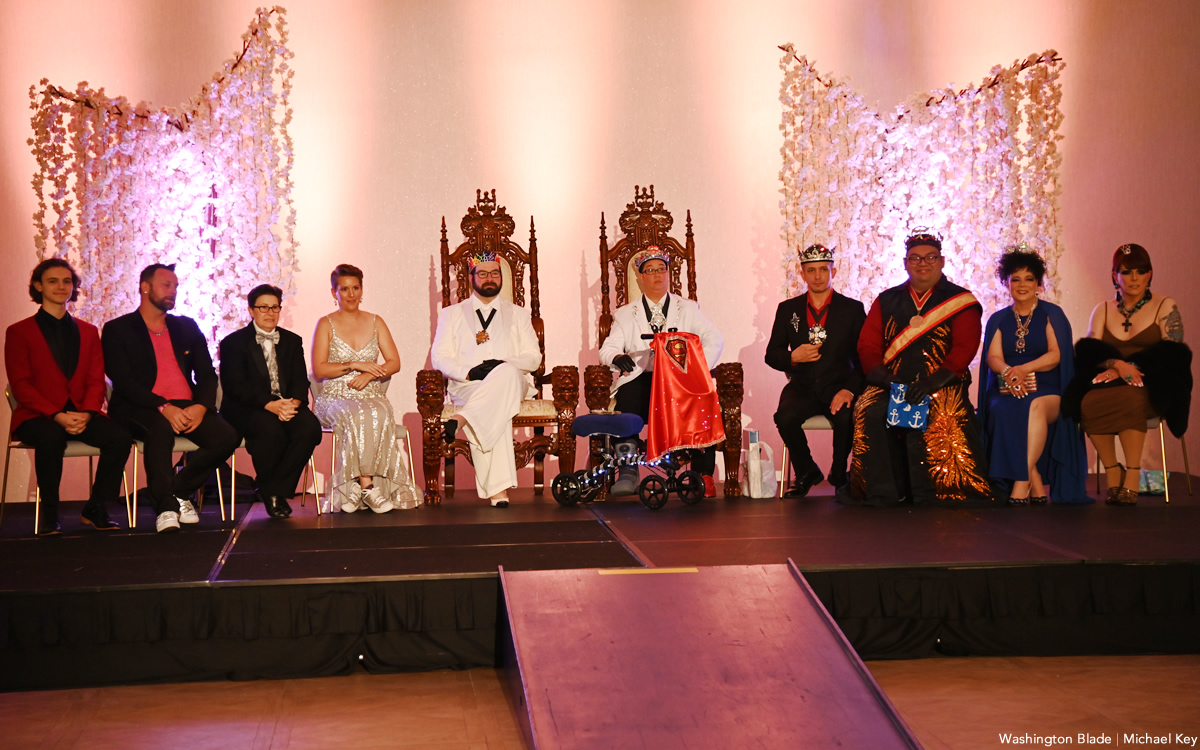
The Imperial Court of Washington, a D.C.-based organization of drag performers that has raised at least $250,000 or more for local LGBTQ and non-LGBTQ charitable groups since its founding in 2010, announced on Jan. 5 that it has ended its operations by dissolving its corporate status.
In a Jan. 5 statement posted on Facebook, Robert Amos, president of the group’s board of directors, said the board voted that day to formally dissolve the organization in accordance with its bylaws.
“This decision was made after careful consideration and was based on several factors, including ongoing challenges in adhering to the bylaws, maintaining compliance with 501(c)(3) requirements, continued lack of member interest and attendance, and a lack of community involvement and support as well,” Amos said in his statement.
He told the Washington Blade in a Jan. 6 telephone interview that the group was no longer in compliance with its bylaws, which require at least six board members, when the number of board members declined to just four. He noted that the lack of compliance with its bylaws also violated the requirements of its IRS status as a nonprofit, tax-exempt 501(c) (3) organization.
According to Amos, the inability to recruit additional board members came at a time when the organization was continuing to encounter a sharp drop in support from the community since the start of the COVID pandemic around 2020 and 2021.
Amos and longtime Imperial Court of Washington member and organizer Richard Legg, who uses the drag name Destiny B. Childs, said in the years since its founding, the group’s drag show fundraising events have often been attended by 150 or more people. They said the events have been held in LGBTQ bars, including Freddie’s Beach Bar in Arlington, as well as in other venues such as theaters and ballrooms.
Among the organizations receiving financial support from Imperial Court of Washington have been SMYAL, PFLAG, Whitman-Walker Health’s Walk to End HIV, Capital Pride Alliance, the DC LGBT Community Center, and the LGBTQ Fallen Heroes Fund. Other groups receiving support included Pets with Disabilities, the Epilepsy Foundation of Washington, and Grandma’s House.
The Imperial Court of Washington’s website, which was still online as of Jan. 6, says the D.C. group has been a proud member of the International Court System, which was founded in San Francisco in 1965 as a drag performance organization that evolved into a charitable fundraising operation with dozens of affiliated “Imperial Court” groups like the one in D.C.
Amos, who uses the drag name Veronica Blake, said he has heard that Imperial Court groups in other cities including Richmond and New York City, have experienced similar drops in support and attendance in the past year or two. He said the D.C. group’s events in the latter part of 2025 attracted 12 or fewer people, a development that has prevented it from sustaining its operations financially.
He said the membership, which helped support it financially through membership dues, has declined in recent years from close to 100 to its current membership of 21.
“There’s a lot of good we have done for the groups we supported, for the charities, and the gay community here,” Amos said. “It is just sad that we’ve had to do this, mainly because of the lack of interest and everything going on in the world and the national scene.”
District of Columbia
Two pioneering gay journalists to speak at Thursday event
Blade’s Chibbaro, Falls Church News-Press’s Benton talk long careers
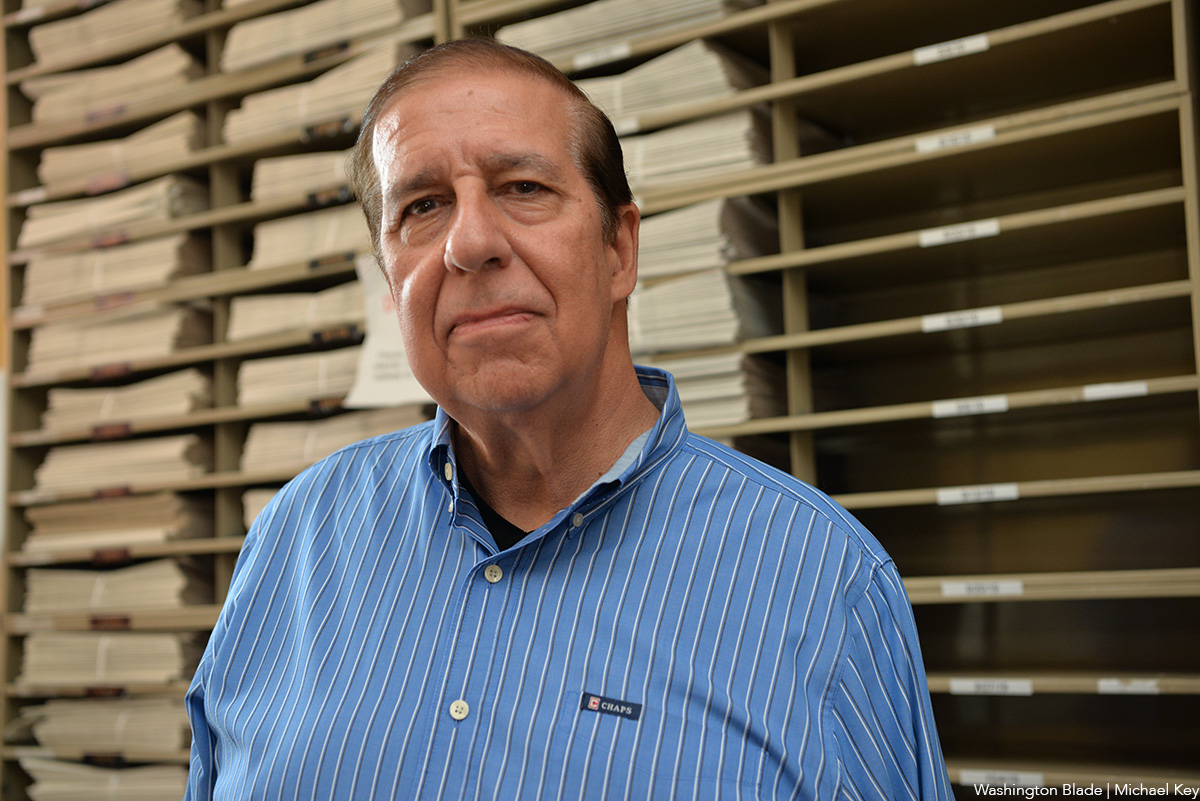
Two local gay journalists will speak on a panel this week about their long, pioneering careers.
A celebration of the Falls Church News-Press’s Nicholas Benton and the Washington Blade’s Lou Chibbaro Jr., two trailblazing LGBTQ journalists who have spent decades reporting on the front lines of social, cultural, legal, and political change in America, will be held this Thursday, Jan. 8, at the Women’s National Democratic Club of Washington. D.C., 1526 New Hampshire Avenue, N.W., at 6 p.m., according to a statement from organizers.
The program will explore their journeys, the evolution of LGBTQ journalism, and the ongoing fight for equality and justice. Benton and Chibbaro will also examine the various factors causing many news outlets to cease print publication and their energetic efforts to continue publishing their work both in print and online.
EVENT DETAILS:
- Remarks and Q&A, in-person and via Zoom.
- 6 p.m. complimentary hors d’oeuvres and cash bar; 6:30–7:30 p.m. program followed by book signing.
- Zoom only: $10. In-person: members: $20, nonmembers: $30 plus tax.
Benton’s latest book, “Please Don’t Eat Your Children, Cult Century, and Other Essays,” will be available for purchase at the event.
Benton is a longtime local journalist and LGBTQ rights activist whose work has had a lasting impact on both community journalism and social justice. Author of the first-ever editorial in the pioneering Gay Sunshine newspaper in 1970, he is best known as the founder, owner, and editor of the Falls Church News-Press, an independent weekly newspaper he launched in 1991 and is the paper of record for the City of Falls Church, Virginia.
Chibbaro is the senior news reporter for the Washington Blade and a pioneering journalist in LGBTQ news coverage. He has reported on the LGBTQ rights movement and community continuously since 1976, first as a freelance writer and later as a staff reporter, joining the Blade in 1984.
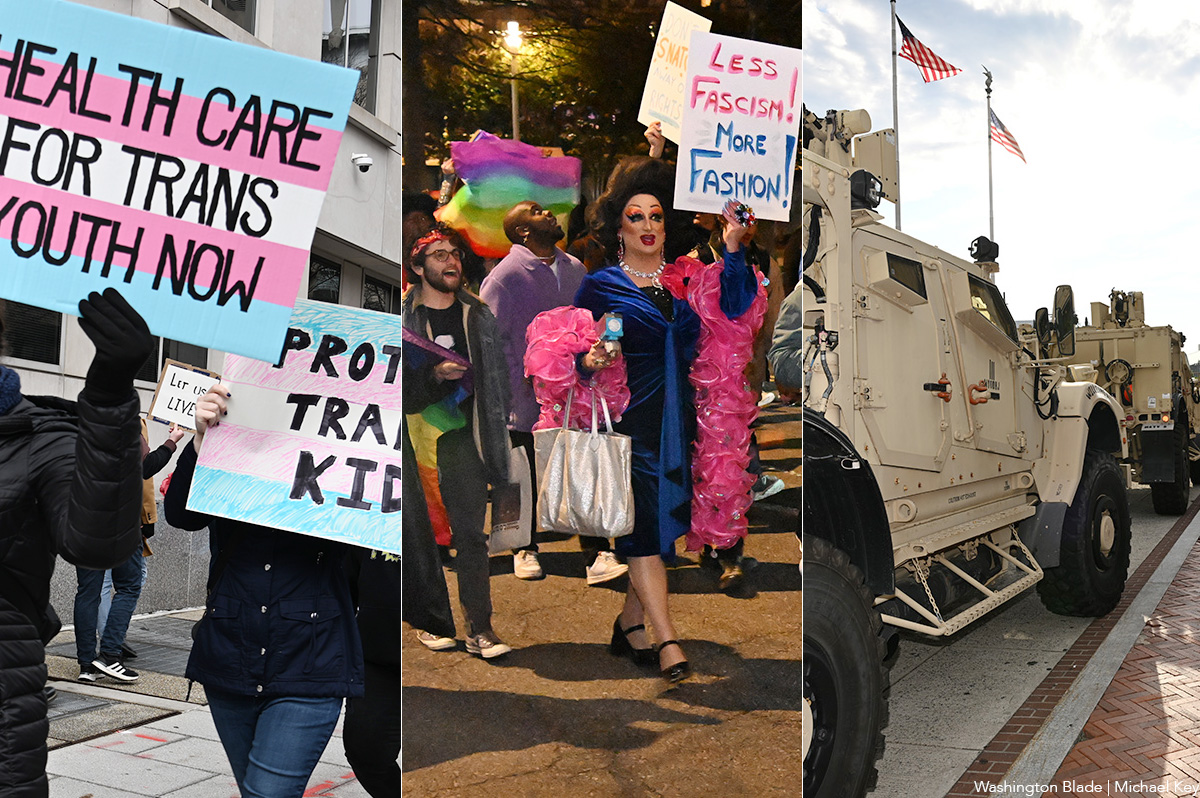
The year 2025 brought unprecedented challenges to D.C. as President Trump initiated a takeover of local police operations and implemented ICE raids in the city. Below are our picks for the top 10 LGBTQ news stories of the year.
10. Man gets 15 years for drug sale that led to deaths of two gay men
A D.C. man was sentenced by a federal judge on June 26, 2025, to 15 years in prison after he pleaded guilty three months earlier to conspiracy related charges that he distributed large amounts of fentanyl and cocaine in the D.C. area, including the sale of fentanyl that resulted in the December 2023 deaths of two D.C. gay men.
A statement released by the Office of the U.S. Attorney for D.C. said Jevaughn Mark, 33, was charged, among other things, with selling fentanyl rather than the requested ketamine, known as “Special K,” to one of the two gay victims who shared the drug with his gay friend. Police identified the men as Brandon Roman, 38, a prominent D.C. attorney and LGBTQ rights advocate, and Robbie Barletta, 28, a home renovation business owner and historic preservationist.
An official with the D.C.-based group HIPS, which provides services to drug users, called the deaths of the two men a poisoning rather than an overdose because they unknowingly consumed the highly toxic fentanyl rather than the ketamine they thought they had.
9. Drag queens, protesters denounce Trump’s Kennedy Center takeover
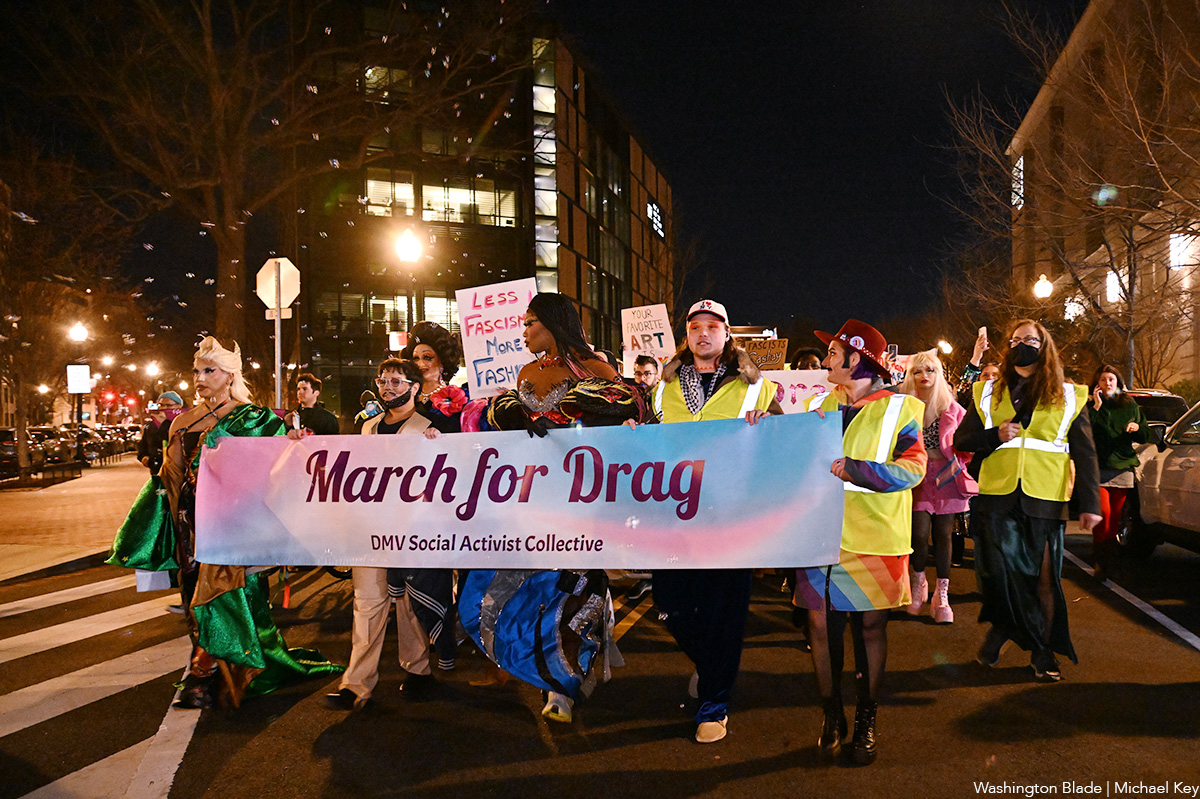
D.C. drag performer Tara Hoot was among other drag queens and about 100 supporters who marched in February from Washington Circle to the Kennedy Center to protest President Donald Trump’s Kennedy Center “takeover” by his appointment of Trump supporters to the performing arts facility’s board of directors.
Hoot and three other local drag performers followed up with their own Kennedy Center protest in June by attending the Kennedy Center’s opening night performance of “Les Misérables” while Trump himself was in attendance. Among the concerns raised by the protesters was the Kennedy Center’s decision in February to cancel a performance by the Gay Men’s Chorus of Washington scheduled for May to celebrate the upcoming WorldPride 2025 DC events. A Kennedy Center spokesperson said the performance was canceled because of “financial” and “scheduling” factors and not by the Trump initiated management changes.
8. D.C. LGBTQ Center celebrates opening of new, larger offices

The D.C. LGBTQ+ Community Center officially opened its new expanded offices on April 26 at 1828 Wiltberger St., N.W., located one block from the Shaw Metro station.
Spanning 6,671 square feet of intentionally designed space, Center Director Kimberley Bush said the new space would offer a wide range of resources for LGBTQ individuals in need – including mental health services, job readiness programs, cultural events and community support groups, all under one roof.
7. Deaths of five key local LGBTQ advocates in 2025
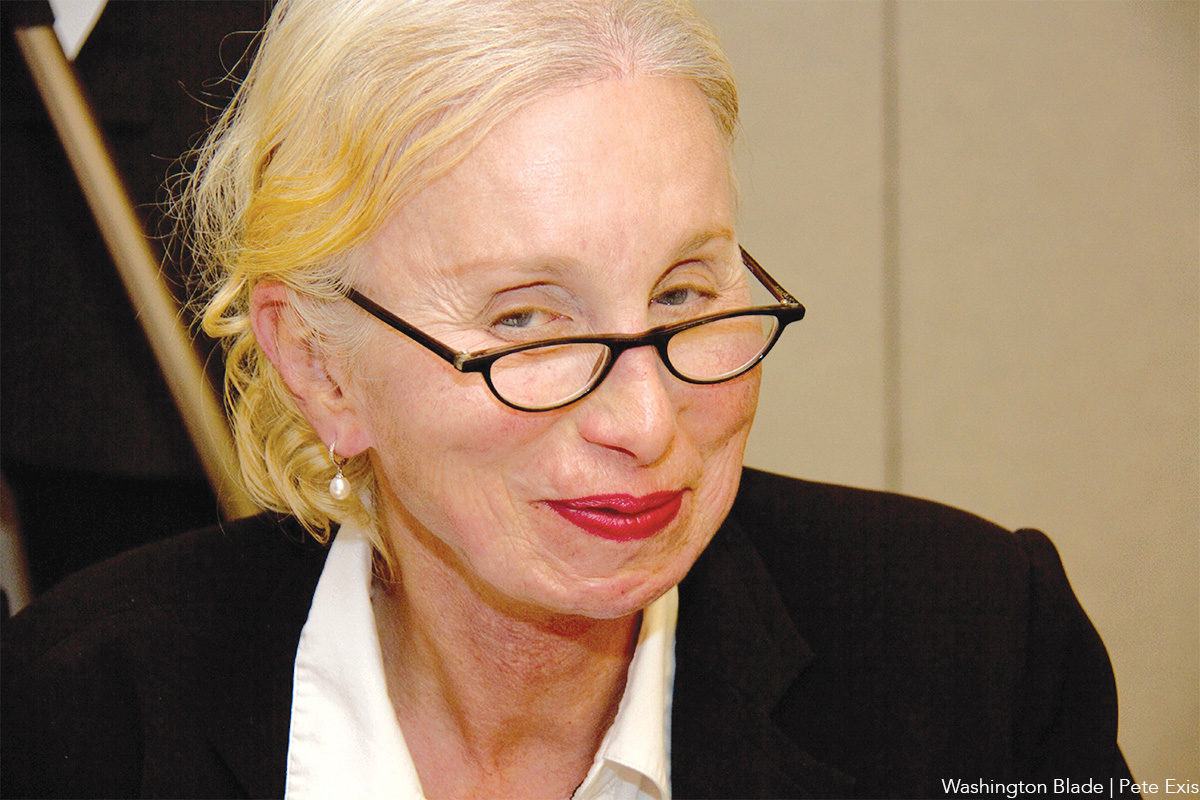
The LGBTQ community took note of the passing of at least five highly regarded local LGBTQ advocates in 2025. Among them were Jeri Hughes, 73, a longtime local transgender rights activist; Dale Sanders, 75, a highly acclaimed D.C. attorney for more than 40 years who played a leading role in providing legal services to people with HIV/AIDS; Patrick Shaw, 60, a highly regarded D.C. public schools teacher; Thomas Mangrum, 61, an acclaimed advocate for people with disabilities and LGBTQ rights activist involved in the city’s Capital Pride events; and Loraine Hutchins, a nationally known and acclaimed advocate for bisexual and LGBTQ rights, and co-author and editor of a groundbreaking book on bisexuality.
6. Pro-LGBTQ Spanberger elected Va. governor
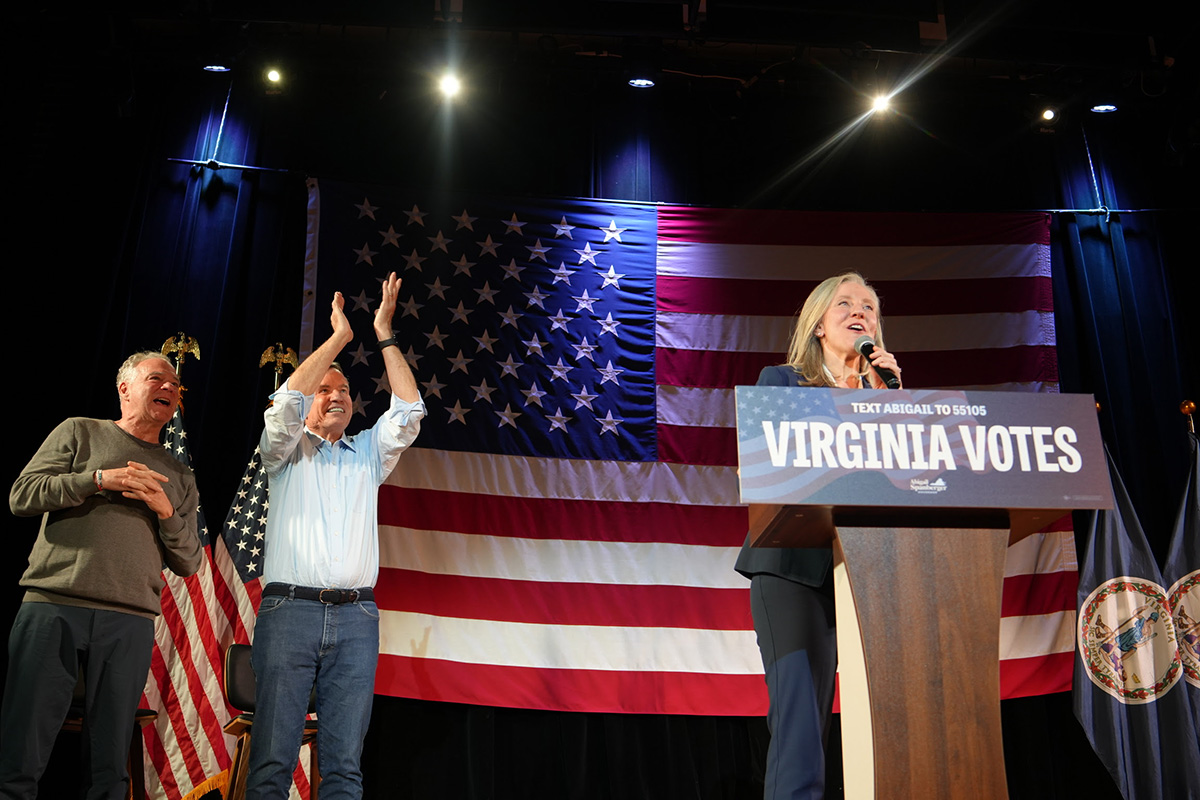
Former congresswoman and longtime LGBTQ rights supporter Abigail Spanberger (D) won her race for governor of Virginia on Nov. 6, defeating the state’s Republican lieutenant governor, Winsome Earle-Sears, who expressed strong opposition to LGBTQ equality. Spanberger, who will succeed incumbent GOP Gov. Glenn Youngkin in January, becomes Virginia’s first female governor.
Meanwhile, John Reid, a gay conservative radio talk show host in Richmond for many years, lost his race as the Republican candidate for lieutenant governor in Virginia, falling short of becoming the state’s first openly gay person to win a statewide office. Reid lost to Democrat Ghazala Hashmi, a member of the Virginia State Senate, who became the first Muslim woman to win election to a statewide office in any state.
5. Trans erasure hits D.C.
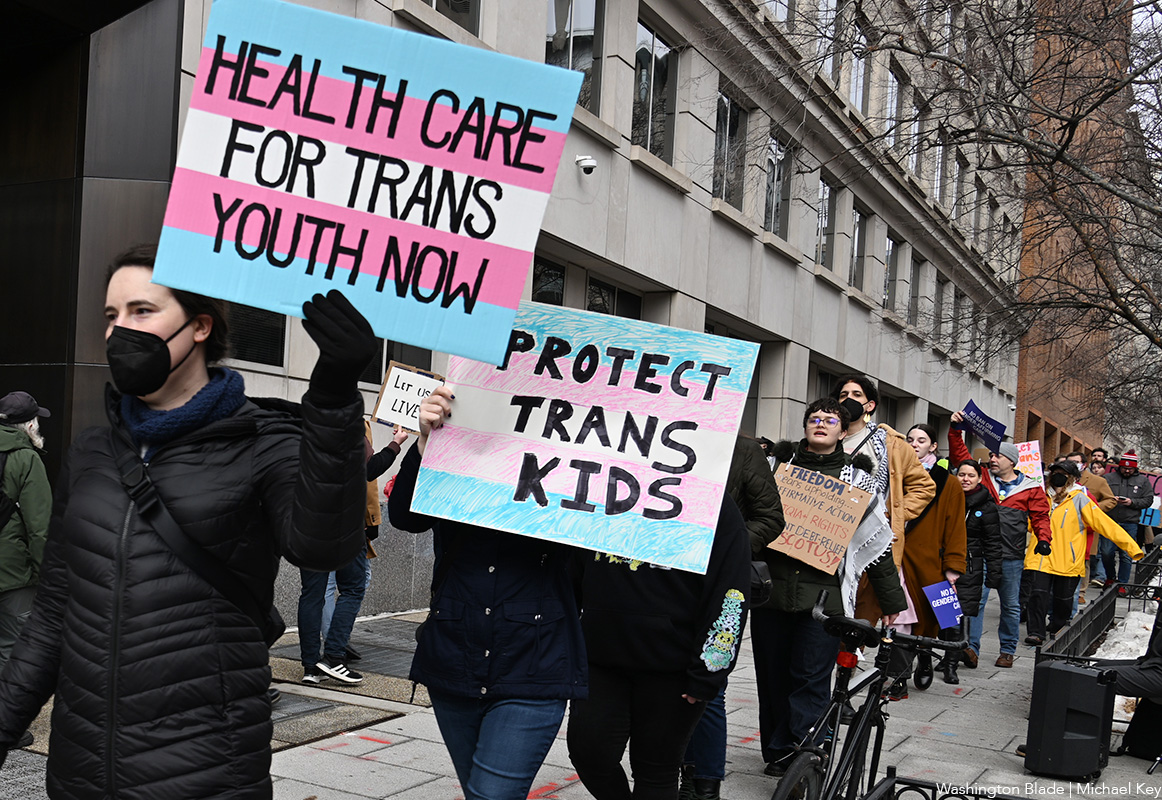
The National Park Service, which owns and maintains Dupont Circle as a federal park, in February removed all references to transgender people from its website devoted to Dupont Circle history. In a development believed to be linked to one of President Trump’s early executive orders banning federal support for trans related issues, the Park Service removed all mention of trans people from its website but left on the site multiple references to the “GLB community.”
In yet another act of what LGBTQ activists are calling “trans erasure,” D.C.’s Children’s National Hospital in July announced it would discontinue beginning Aug. 30 gender transition medical care it has provided for juvenile patients for at least the past 20 years. In a statement posted on its website, the highly acclaimed pediatric hospital said the change was made “in light of escalating legal and regulatory risks to Children’s National.” Most observers interpreted that to mean the risk of federal funding cuts linked to the Trump administration’s animus toward trans supportive programs or policies.
4. D.C. Mayor Bowser announces she will not run for re-election

D.C. Mayor Muriel Bowser, a longtime vocal supporter of the LGBTQ community, announced on Nov. 25 that she will not run for a fourth term. Since first taking office as mayor in January 2015, Bowser has been an outspoken supporter on a wide range of LGBTQ-related issues, including marriage equality and services for LGBTQ youth and seniors.
LGBTQ activists have pointed out that Bowser’s record of support on LGBTQ issues dates back to her tenure as the Ward 4 D.C. Council member from 2007 through January 2015, when she took office as mayor. They also credit her with expanding and significantly increasing funding for the Mayor’s Office of LGBTQ Affairs and appointing the largest number of openly LGBTQ officials to D.C. government jobs than any prior D.C. mayor.
“It has been the honor of my life to be your mayor,” Bowser said in a statement.
3. D.C. LGBTQ bars ‘hanging in there’ amid tough economy

The owners of several of D.C.’s at least 25 LGBTQ bars told the Blade in November they had been negatively impacted by a series of developments and issues impacting most other D.C. bars, restaurants, and nightlife venues. Among the lead issues impacting them, they said, were the deployment by President Trump of National Guard troops on city streets, the nearly two-month-long federal government shutdown that ended in late November, and skyrocketing prices of food and other supplies brought about by the Trump administration’s tariff program.
Other factors cited were a decline in tourist visits to D.C. due to alienation from the Trump administration and a large increase in the number of LGBTQ bars in recent years that some observers said has resulted in fewer people going to each of the LGBTQ bars, the latest one, Rush at 14th and U Street, N.W., having opened in December.
2. At least 1.2 million turn out for WorldPride D.C.

At least 1.2 million people turned out from throughout the U.S. and internationally for WorldPride D.C. 2025, which took place from mid-May through June. It included hundreds of events held across the city. Among them were an international human rights conference, a March on Washington for LGBTQ Equality, sporting events with LGBTQ athletes, concerts by LGBTQ choral groups and nationally acclaimed pop musicians.
The events culminated with a six-hour-long WorldPride Parade on June 7 that drew hundreds of thousands of participants and bystanders and included a 1,000-foot long rainbow flag that led the parade. The WorldPride street festival and concert took place that same day and the following day, on June 8, along Pennsylvania Ave, N.W. that included hundreds of booths.
The 1.2 million attendance and the a $310 million economic impact it had on the city were significantly less that what had been initially predicted by city officials, who, along with LGBTQ activists, said the lower attendance and economic impact was due in part to the anti-LGBTQ policies and alienation of many potential foreign visitors by the Trump administration.
1. Trump takes control of D.C. police, deploys National Guard

LGBTQ rights advocates joined community leaders across the city in condemning President Donald Trump’s decision in August to take control of the D.C Metropolitan Police Department and deploy 800 National Guard troops to address what he called a crime wave caused by “bloodthirsty criminals” and “roving mobs of wild youth.”
A coalition of local LGBTQ advocacy organizations joined other community leaders, including gay D.C. Council member Zachary Parker (D-Ward 5), in calling Trump’s action a “power grab” aimed at eliminating D.C.’s locally elected government that would adversely impact people of color, the LGBTQ and immigrant communities.
In a development that captured national attention, a gay man was arrested on Aug. 10 on a misdemeanor assault charge for tossing a hero sandwich into the chest of a uniformed U.S. Customs and Border Control agent on a street near several gay bars in what he called an act of protest and defiance of the Trump deployment of federal troops and agents in D.C. In what some observers called a gesture of support for gay sandwich thrower Sean Charles Dunn, a federal court jury handed down a verdict of not guilty for the assault charge.

















